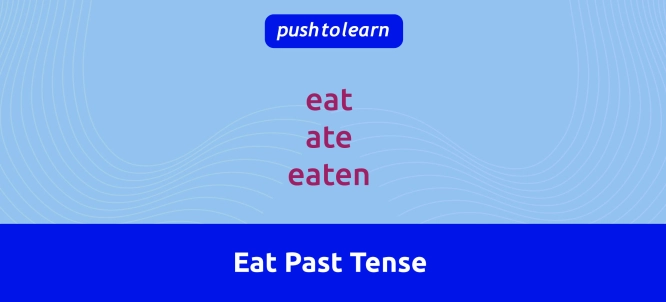by PushtoLearn
Eat Past Tense
Table of Contents
Eat Past Forms - Exercises
These exercises test different forms of the verb EAT and IRREGULAR VERBS
Meaning
The verb "eat" means to consume food or to take in nourishment.
Example:
-
"I eat breakfast at 7 a.m. every day."
-
"She eats fruit with every meal."
When referring to past actions, "eat" changes to "ate."

Forms of "Eat"
|
Tense |
Form |
Example Sentence |
|
Present |
eat |
"I eat dinner with my family every evening." |
|
Past |
ate |
"Yesterday, I ate pizza for lunch." |
|
Past Participle |
eaten |
"She has eaten all the cookies already." |
|
Present Participle |
eating |
"They are eating at a new restaurant downtown." |
Examples of "Eat" in Sentences
Past Tense (ate):
-
"He ate a delicious meal at the new Italian restaurant."
-
"I ate too much cake at the party last night."
-
"They ate breakfast together before going to work."
Past Participle (eaten):
-
"She has eaten sushi many times before."
-
"The children had eaten all the candy by the time we arrived."
-
"I have never eaten such a delicious dessert before."
Common Mistakes with "Eat"
1. Using "eated" instead of "ate" or "eaten":
A common error is adding "-ed" to "eat" to form the past tense or past participle, which is incorrect.
-
Incorrect: "I eated breakfast this morning."
-
Correct: "I ate breakfast this morning."
-
Incorrect: "She has eated all her vegetables."
-
Correct: "She has eaten all her vegetables."
2. Mixing up "ate" and "eaten":
Learners often confuse the simple past tense "ate" with the past participle "eaten."
-
Incorrect: "I have ate too much."
-
Correct: "I have eaten too much."
-
Incorrect: "He had ate dinner before I arrived."
-
Correct: "He had eaten dinner before I arrived."
3. Using "eat" in place of "have" for meals:
In English, "have" is often used to describe meals, and using "eat" directly in some contexts can sound awkward.
-
Incorrect: "I usually eat dinner at 7 PM." (technically correct, but less common)
-
Correct: "I usually have dinner at 7 PM."
-
Incorrect: "We ate a breakfast together."
-
Correct: "We had breakfast together."
4. Misusing "eat" in figurative expressions:
"Eat" can be used figuratively, and learners sometimes misuse it in these contexts.
-
Correct: "He had to eat his words after realizing he was wrong." (accept he was mistaken)
-
Correct: "The project is eating into our budget." (using up resources)
5. Using "ate" for future actions:
Learners may incorrectly use "ate" to describe actions in the future, but "ate" is only for past actions.
-
Incorrect: "I will ate lunch after the meeting."
-
Correct: "I will eat lunch after the meeting."
Practice more Irregular Verbs such as Meet, Catch, Ski and Past Simple in general. Don’t forget to explore other Grammar Exercises A1.
FAQ
What is the past tense of "eat"?
The past tense of "eat" is "ate."
How do I use "ate" in a sentence?
Use "ate" to describe eating that happened in the past.
Example: "We ate dinner at a fancy restaurant last night."
What is the past participle of "eat"?
The past participle of "eat" is "eaten."
Example: "She has eaten all the snacks already."
Is "eated" correct?
No, "eated" is not correct. Always use "ate" for the past tense and "eaten" for the past participle.
5. Can "eat" be used figuratively?
Yes! Example: "The team had to eat their words after underestimating their opponent," meaning they admitted they were wrong.

